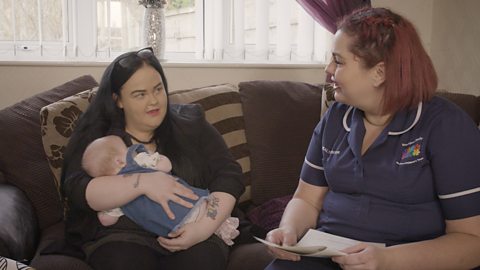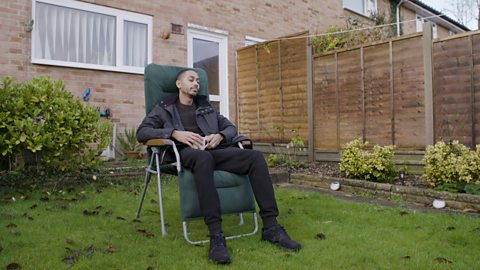Everyone's new mum experience is different, but one certainty is that the first few days and weeks with your baby will be challenging.
No-one breezes through these first weeks like a pro ŌĆō despite what they might post on social media.
ŌĆ£You might have these expectations of how youŌĆÖre going to be but you have to be realistic,ŌĆØ says Maggie Fisher, a specialist health visitor and Professional Development Officer at the Institute of Health Visiting.
ŌĆ£Nothing can totally prepare you for this time or for the feelings that youŌĆÖll experience, so be kind to yourself. And donŌĆÖt say no to any offers of help, remember that things will settle down. In the first six weeks, itŌĆÖs about getting by.ŌĆØ
HereŌĆÖs MaggieŌĆÖs best advice on surviving the first few days and weeks, sprinkled with wisdom from the Tiny Happy People community.
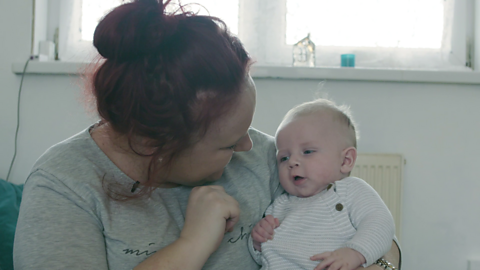
Your body
ItŌĆÖs vital to give yourself time to heal ŌĆō your body has just been through a remarkable physical experience.
ŌĆ£YouŌĆÖve probably got a flabby tummy, stretchmarks, your nipples might be sore, your perineum might be sore, you might have back pain, you might be leaking milk, you might have piles, you might be experiencing leaking and discharge,ŌĆØ says Maggie.
ItŌĆÖs perfectly normal to be feeling unattractive and overwhelmed, particularly if you had a difficult delivery.
But donŌĆÖt suffer in silence with any symptoms ŌĆō remember that no question is too daft or embarrassing for your midwife, health visitor or GP. ŌĆ£These are the realities of being a mum, so donŌĆÖt be afraid to speak out,ŌĆØ says Maggie.
Take things slowly, eat healthily and snatch sleep when you can.
ŌĆ£ItŌĆÖs also really important to do your pelvic floor exercises as regularly as possible ŌĆō whenever you can, like sitting down and feeding your baby. DonŌĆÖt leap back into exercise, particularly if youŌĆÖve had a caesarean, as youŌĆÖre at increased risk of injury. Gentle exercise is so important.ŌĆØ
Top tips from THP mums
- ŌĆ£The biggest, comfiest maternity pads possibleŌĆ” and lots of them!ŌĆØ
- ŌĆ£Ice packs, a breastfeeding pillow and ibuprofen if you need it.ŌĆØ
- ŌĆ£DonŌĆÖt compare yourself to friends or celebrities who appear to have dropped seven dress sizes three days after giving birth ŌĆō it isnŌĆÖt realistic!ŌĆØ
- ŌĆ£Go easy on yourself. ItŌĆÖs hard, but you can get through it. Rest and sleep when you can and just enjoy the cuddles.ŌĆØ
- ŌĆ£Try to have healthy snacks on hand you can grab and donŌĆÖt need to prepare like fruit and cereal bars. And make your hot drinks in travel mugs, so they donŌĆÖt go cold too quick.ŌĆØ
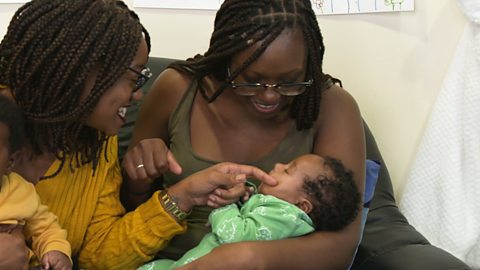
Your mind
ŌĆ£ItŌĆÖs natural to feel down sometimes, but if these feelings are happening a lot of the time, then you need to talk to someone about it,ŌĆØ says Maggie. ŌĆ£There are warning signs to look out for: feeling continually low or anxious, changes in your appetite and sleeping, intrusive thoughts crying, lack of enjoyment in things that you normally."
ItŌĆÖs really hard to admit how hard parenting is and that you need help. You probably want to put on a brave show. But my message is always, itŌĆÖs OK to not be OK.
And remember that building a bond with your baby can take a long time, adds Maggie ŌĆ£Lots of mums donŌĆÖt always fall in love with their baby straightaway, and can feel like a real failure. ItŌĆÖs really important that you donŌĆÖt suffer in silence. Please pick up the phone, talk to us, tell us if youŌĆÖre struggling.ŌĆØ
Small, positive steps every day can really help.
ŌĆ£There are some really good apps out to give you little nudges like the one from Action For Happiness. Try gentle yoga, mindfulness and walk every day in the fresh air ŌĆō itŌĆÖs brilliant exercise and you can meet with other mums outdoors,ŌĆØ say Maggie.
ŌĆ£Connecting with other mums, be it in real life, on an online forum, WhatsApp groups or Zoom calls is important. Hearing their experiences is a comfort. It can also help reduce social isolation and normalise what youŌĆÖre feeling.ŌĆØ
Lots of us donŌĆÖt realise that other people are feeling the same way, particularly around mental health, until we open up.
ŌĆ£To hear another mum say ŌĆśitŌĆÖs awful, but it will get betterŌĆÖ can make all the difference.ŌĆØ
Top tips from THP mums
- ŌĆ£Please remember it will get easier. You never get back the first week where they just sleep, cuddle and smell like a newborn, so try to enjoy it. Embrace sleeping in the day, PJs, takeaways and throw in a piece of fruit every so often.ŌĆØ
- ŌĆ£A baby carrier wrap. You will want to use the toilet, eat or brush your hair once in a while.ŌĆØ
- ŌĆ£Drop your standards. ItŌĆÖs OK not to vacuum.ŌĆØ
- ŌĆ£Breathe and keep going until the morning. And get a Netflix or BritBox subscription!ŌĆØ
- ŌĆ£Always make time for showers they will keep you awake and make you feel more human.ŌĆØ
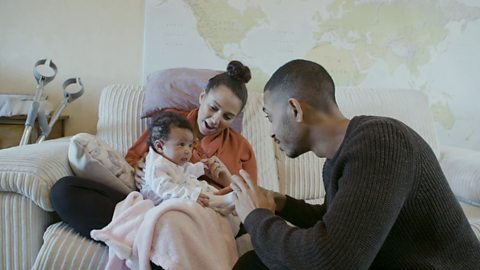
Your close relationships
ThereŌĆÖs no denying that your closest relationships are hugely impacted when baby arrives.
ŌĆ£ThereŌĆÖs an increase in couple conflict in the year after having a baby. Common flare points are household tasks, finances and sex, which is the last thing on any new mumŌĆÖs mind,ŌĆØ explains Maggie. ŌĆ£You need to keep communicating, be honest and be supportive of each other. This isnŌĆÖt an easy time for either of you and you may both be missing your old lives. Your partner needs to know that theyŌĆÖre not being rejected while you concentrate on recovering and bonding with baby. And what IŌĆÖd say to any partners is: please concentrate on making mum feel good about herself.ŌĆØ
This is undoubtedly a time that you need extra help and support, particularly if youŌĆÖre a solo parent. But even though itŌĆÖs well-meaning, other peopleŌĆÖs advice can also sometimes feel intrusive.
So be clear about the kind of help you want, says Maggie. ŌĆ£DonŌĆÖt be afraid to ask for what you need like shopping, ironing, cooking, laundry, or taking baby out for a couple of hours so that you can get your head down.ŌĆØ
ŌĆ£When youŌĆÖre feeling very tired and sensitive, itŌĆÖs hard having people tell you what you need to be doing. It might be feeling like theyŌĆÖre judging you.ŌĆØ
But listen to your instincts, you are the expert, you know your baby better than anyone else.
ŌĆ£Try to be assertive, say ŌĆśthis is what IŌĆÖve foundŌĆÖ and get your partner onboard to deflect any unwanted advice.ŌĆØ
Top tips from THP mums
- ŌĆ£Work out whoŌĆÖs your go-to person when you need help. Partners are great but when you are both sleep deprived, an extra pair of hands to hold baby or cook you both a meal is essential.ŌĆØ
- ŌĆ£Pull up the drawbridge. If youŌĆÖre not ready for visitors just say, otherwise youŌĆÖll end up with a constant stream and feel so overwhelmed.ŌĆØ
- ŌĆ£Ask visitors to gift home cooked meals, instead of flowers. Flowers are just an extra thing to deal with when you barely have time to wee.ŌĆØ
Further information
For more information about mental health and wellbeing, check out the dedicated area on the .
The Institute of Health Visiting have shared their top tips for parents on a range of topics .
┬ķČ╣į╝┼─ Action Line has details of organisations that can help support you.


